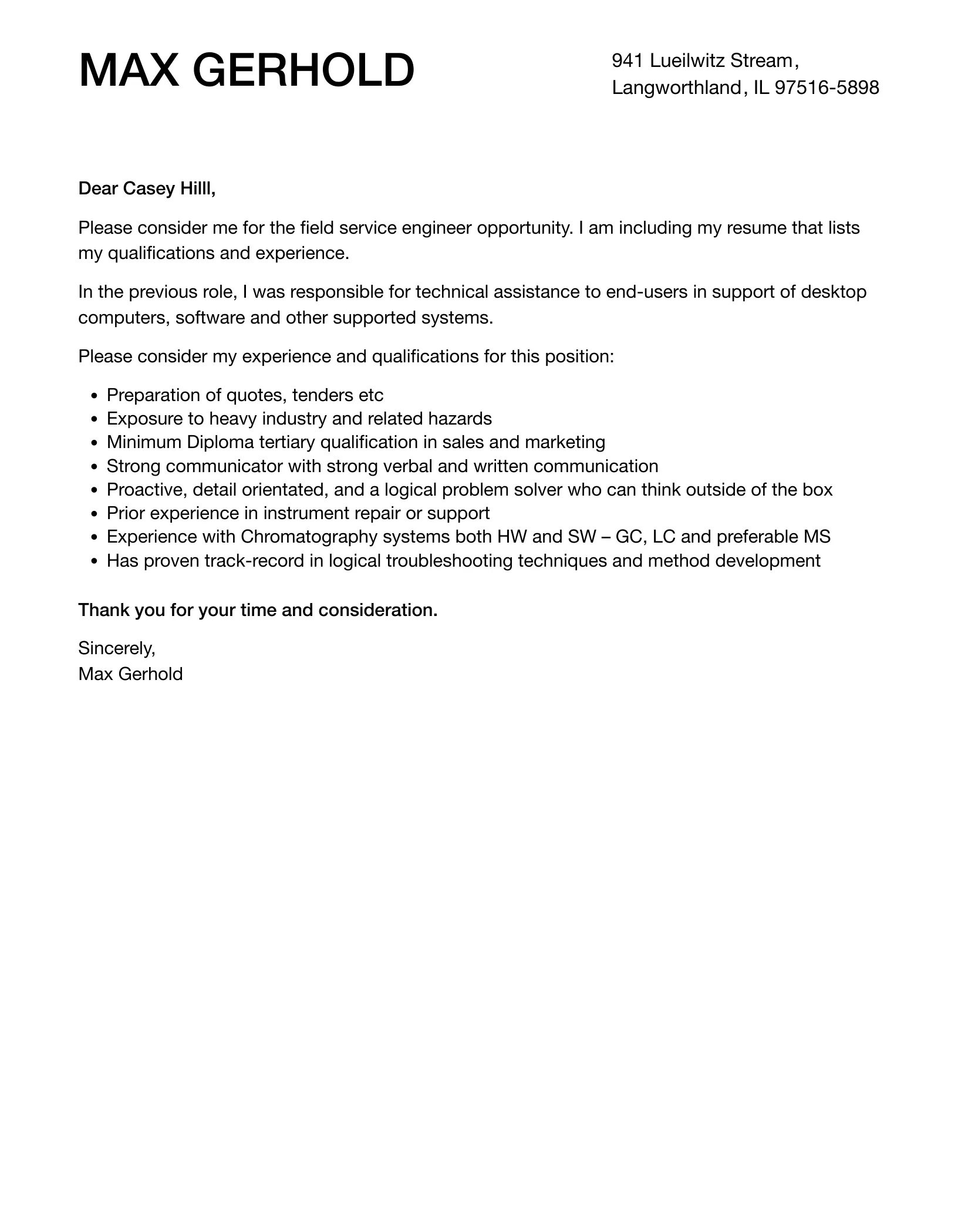Why a Strong Field Service Engineer Cover Letter Matters
In the competitive world of field service engineering, a well-crafted cover letter can be your most valuable asset. It serves as your first impression, offering a crucial opportunity to distinguish yourself from other applicants. Unlike a resume, which provides a summary of your experience, the cover letter allows you to showcase your personality, enthusiasm, and genuine interest in the specific role and company. It’s where you connect your skills and experience with the job requirements, demonstrating why you’re the perfect fit. A strong cover letter sets the stage for a positive evaluation of your resume, increasing your chances of landing an interview. Ignoring this critical step is a missed opportunity to highlight your unique value proposition and potentially secure your dream job. Consider it as a strategic opening statement to your professional profile, a narrative that the hiring manager can resonate with.
Highlighting Your Skills and Experience
Your cover letter is the space to effectively showcase your relevant skills and experience, making sure they align with the job description. Instead of merely listing your qualifications, weave them into a compelling narrative. For example, when describing your experience with diagnostic tools, don’t just say “Proficient with oscilloscopes.” Instead, illustrate how you’ve utilized these tools to troubleshoot complex machinery issues, mentioning the specific results achieved, such as reduced downtime or improved performance. Similarly, when presenting your experience with customer interaction, detail how you built strong client relationships or resolved escalated complaints. By connecting your skills with tangible achievements, you give hiring managers a clear picture of the value you can bring to their team. Focus on matching your experience to the job requirements; this will demonstrate your careful consideration and targeted approach.
Technical Skills to Showcase
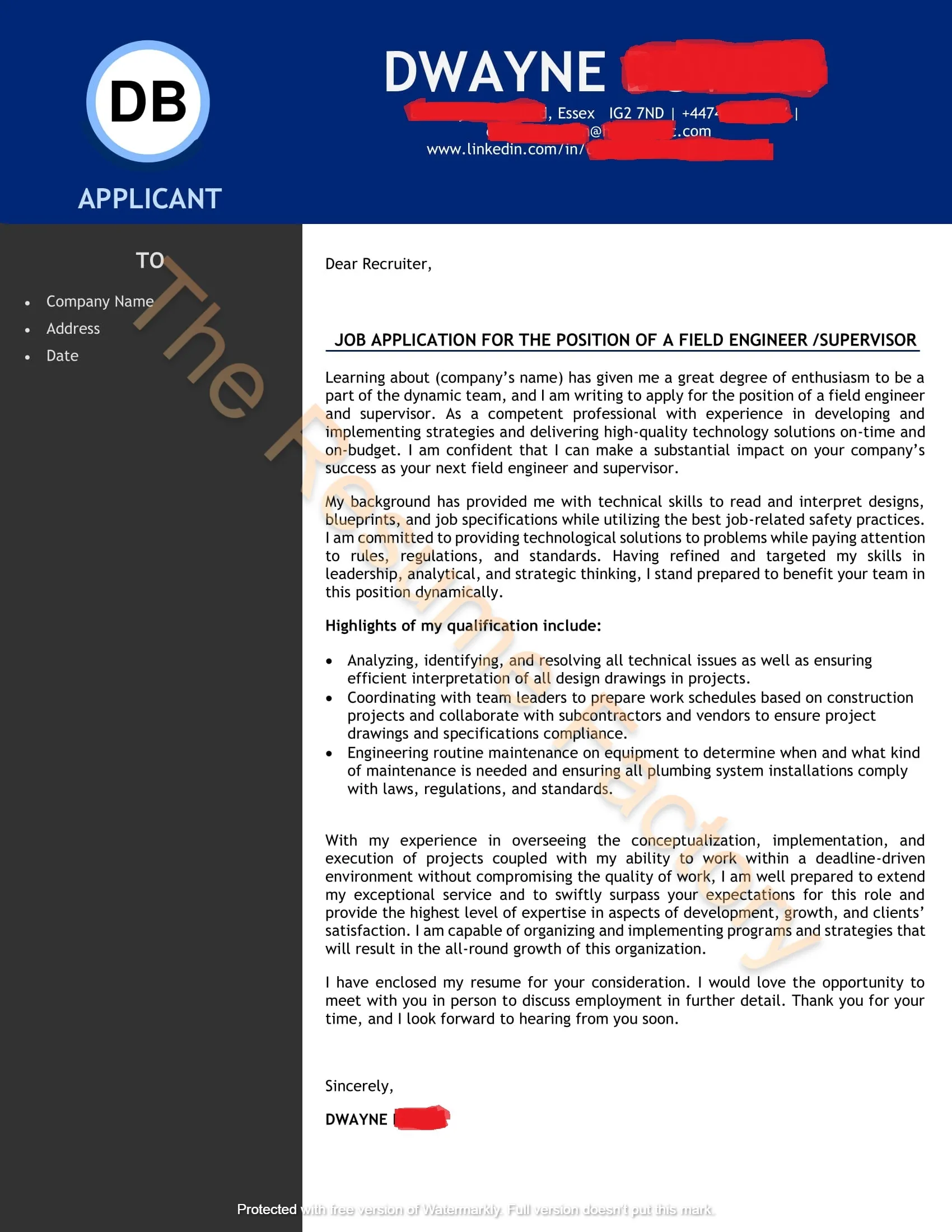
Field service engineers must have an arsenal of technical skills, and highlighting these is critical. Mention your proficiency in working with various types of equipment, such as electrical systems, mechanical components, or software-based systems. Be specific, referencing particular manufacturers, models, or technologies. Detail your experience with troubleshooting methodologies like fault isolation, root cause analysis, or diagnostic testing. Additionally, mention your familiarity with industry-standard tools and software, like PLCs, SCADA systems, or diagnostic software. Ensure that you tailor the technical skills you list to match the job requirements precisely. For example, if the role involves supporting HVAC systems, make sure to highlight your relevant experience and knowledge in that domain. The aim is to provide the hiring manager with immediate clarity regarding your technical competencies.
Problem-Solving Abilities
Field service engineers are essentially problem-solvers. Therefore, a key component of your cover letter should be to show your problem-solving abilities. Describe your experiences in resolving technical issues under pressure and how you handled complex diagnostic challenges. Don’t just mention the problems you’ve solved; discuss the steps you took, the tools and resources you utilized, and the positive outcomes that resulted. For instance, elaborate on a specific instance where you successfully repaired a critical piece of equipment, outlining the diagnostics, troubleshooting steps, and the final outcome. Mention instances where you used your analytical skills to identify and address the root cause of a recurring problem. Always highlight your approach to problem-solving, like your systematic methodology, your capacity for thinking creatively, and your ability to work efficiently under stressful conditions. These details will establish your practical, effective approach to challenges in the field.
Communication and Interpersonal Skills
While technical expertise is vital, excellent communication and interpersonal skills are also essential. Field service engineers spend a lot of time interacting with customers, coworkers, and other stakeholders. Your cover letter should highlight your capacity to communicate clearly and effectively, both verbally and in writing. Give examples of how you successfully communicated complicated technical information to non-technical people. Also, illustrate your ability to build rapport with customers, manage their expectations, and ensure their satisfaction. Mention situations where you have worked with different teams to solve a problem and also showcase your active listening skills and how you’ve used them to understand customer needs. Demonstrating these soft skills is just as crucial as your technical capabilities, since they underscore your overall suitability for the role.
Quantifying Your Achievements
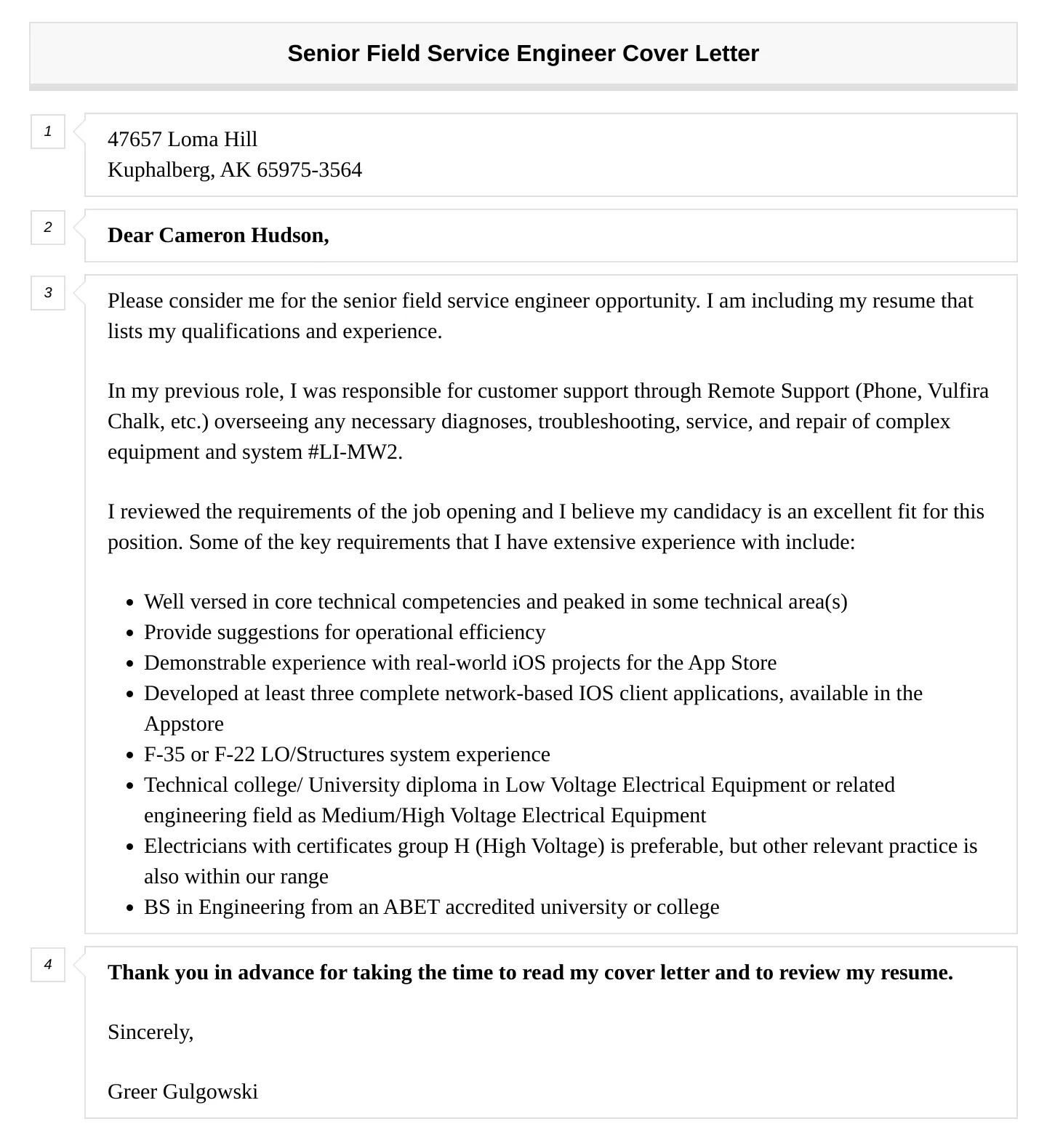
Instead of making generic claims about your skills and accomplishments, it’s essential to quantify your achievements. Use numbers and data to provide tangible evidence of your performance. For example, instead of stating “Improved customer satisfaction,” you might say “Increased customer satisfaction scores by 15% within six months through proactive communication and efficient problem-solving.” Similarly, if you’ve reduced equipment downtime, specify the percentage or the time saved. Quantifying your achievements shows the hiring manager that you’re not just making claims; you’re providing evidence of your impact. This practice makes your qualifications more credible and helps hiring managers grasp the value you’ll bring to their team. Whenever possible, relate your accomplishments to the specific needs of the job, emphasizing the positive results you have achieved in similar settings.
Use Numbers and Data to Impress
Numbers and data make your claims more credible. For example, mention the percentage reduction in repair time you’ve achieved through improved diagnostic skills, or specify the number of customer issues you successfully resolved daily or weekly. Detail the size of the equipment you have maintained or the value of projects you’ve managed. If you improved efficiency, state the percentage gain in output or productivity. When describing your accomplishments, make sure that the numbers are current and are relevant to the job requirements. This data-driven approach transforms your cover letter from a general overview to a compelling narrative of success. It offers the hiring manager clear, measurable proof of your abilities, setting you apart from other applicants who may only make general claims.
Tailoring Your Cover Letter
Generic cover letters are easily identified and often dismissed. Tailoring your cover letter to each specific job application is essential. Carefully read the job description and identify the key requirements, skills, and experiences the employer values. Then, customize your cover letter to address these points directly. Highlight the experiences and skills that directly match the job requirements. If the job description emphasizes a particular technical skill, make sure to highlight your proficiency in that area. Show that you’ve taken the time to understand the specific needs of the role and that you’re excited about contributing to the company’s goals. Such customized approach shows the hiring manager that you’re seriously interested in this role, significantly increasing the likelihood of your application being considered.
Researching the Company and Job
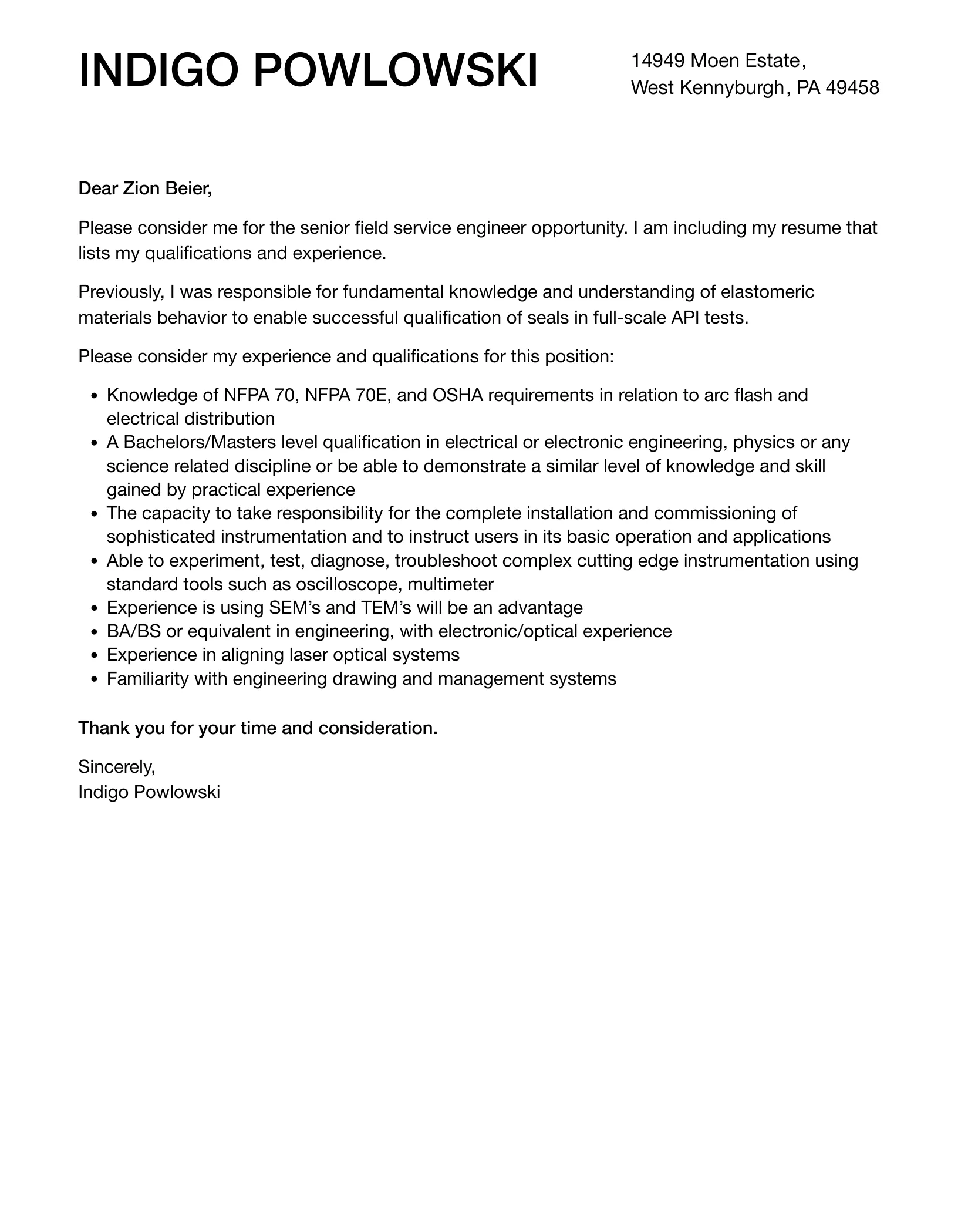
Before you start writing, spend time learning about the company and the specific job you are applying for. Visit their website, read news articles, and scan social media platforms. This research will help you gain insights into the company’s culture, values, and the types of projects they are working on. Use this information to tailor your cover letter, showing that you understand the company’s needs and are excited about contributing to its success. Addressing the company’s current projects, challenges, and goals in your cover letter will establish you as an informed candidate who is keen on being a part of the team. This level of detail shows your initiative and genuine interest, setting you apart from applicants who send generic applications.
Personalizing Your Message
Once you have researched the company and job, it’s time to personalize your message. Avoid using generic phrases or templates. Instead, use specific details from your research to show your genuine interest. If you admire the company’s commitment to sustainability, mention it. If you’re enthusiastic about a specific project, express it. The goal is to make your cover letter unique and reflect your personality. Illustrate how your skills and experience align with the company’s culture and objectives. Showing that you’ve thought about how you would add value to the company, not just what you want from the job, is a key strategy. Such personalization makes the hiring manager feel that you are eager to join the team, which significantly enhances your chances of getting an interview.
Formatting Your Field Service Engineer Cover Letter
The formatting of your cover letter is as crucial as its content. An organized and well-formatted cover letter looks professional and is easy to read. Use a standard font such as Arial or Times New Roman, and make sure the font size is between 10 and 12 points. Employ clear spacing, and use short paragraphs and bullet points to break up the text. This makes the letter more readable and allows the hiring manager to easily find the information they need. Avoid using long blocks of text. Highlight your qualifications in a structured and concise format. Ensure your cover letter’s overall appearance is clean, professional, and simple.
Header and Contact Information
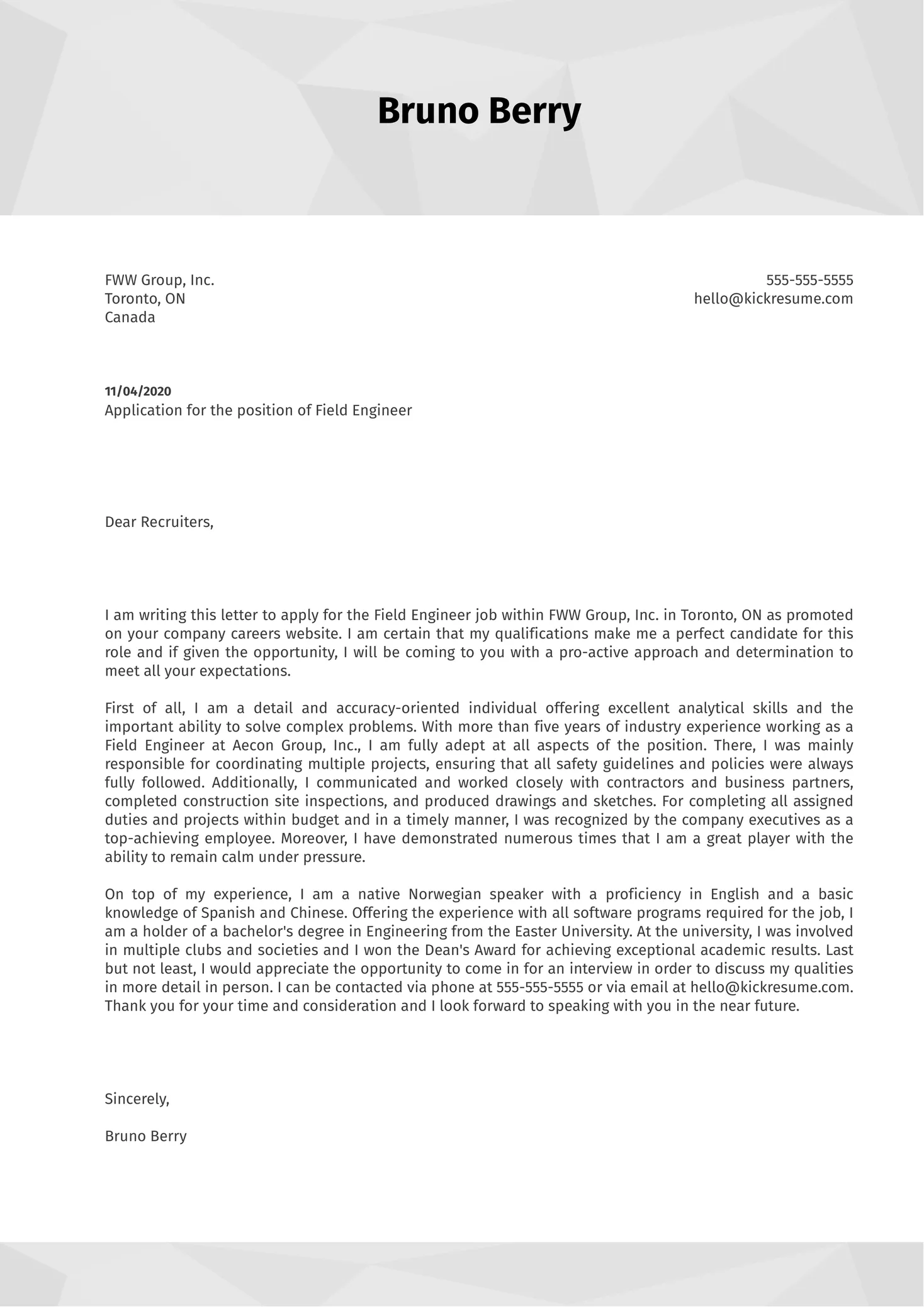
Your cover letter header should contain your contact information, including your name, phone number, email address, and LinkedIn profile (if you have one). This information should be clearly visible at the top of the letter. Also, include the date and the hiring manager’s name and title if you know it. If you’re unsure of the hiring manager’s name, you can use a general greeting like “Dear Hiring Manager.” Accuracy is essential here. Make sure that your contact details are correct and updated; otherwise, the hiring manager can’t reach you. Make sure the header is formatted professionally and consistent with your resume. Keep it clean and easy to read, and avoid any unnecessary graphics or design elements.
Professional Tone and Language
The language you use in your cover letter should always be professional. Avoid slang, jargon, and informal language. Use a formal tone and write in a clear, concise manner. Focus on positive, action-oriented language. Instead of saying “I was responsible for,” try “I managed,” “I led,” or “I implemented.” Demonstrate confidence and enthusiasm, but avoid being overly boastful. Make sure your writing reflects your professionalism and attention to detail. Use correct grammar, punctuation, and spelling. Proofread your letter multiple times to make sure there are no errors. The goal is to project a polished and professional image that will impress the hiring manager.
Proofreading and Editing
Before you submit your cover letter, proofreading and editing are critical steps. Errors in grammar, spelling, or punctuation can easily ruin your chances of being considered. Read your cover letter multiple times, and read it aloud to catch any mistakes. Also, have a friend, family member, or career counselor review your letter. Fresh eyes can often spot errors that you might miss. Focus on consistency in formatting, language, and tone. Check that your contact details are correct and that all the information is up-to-date. Proofreading and editing shows your professionalism and your attention to detail. These steps will significantly improve your cover letter, increasing your chances of success.
Conclusion
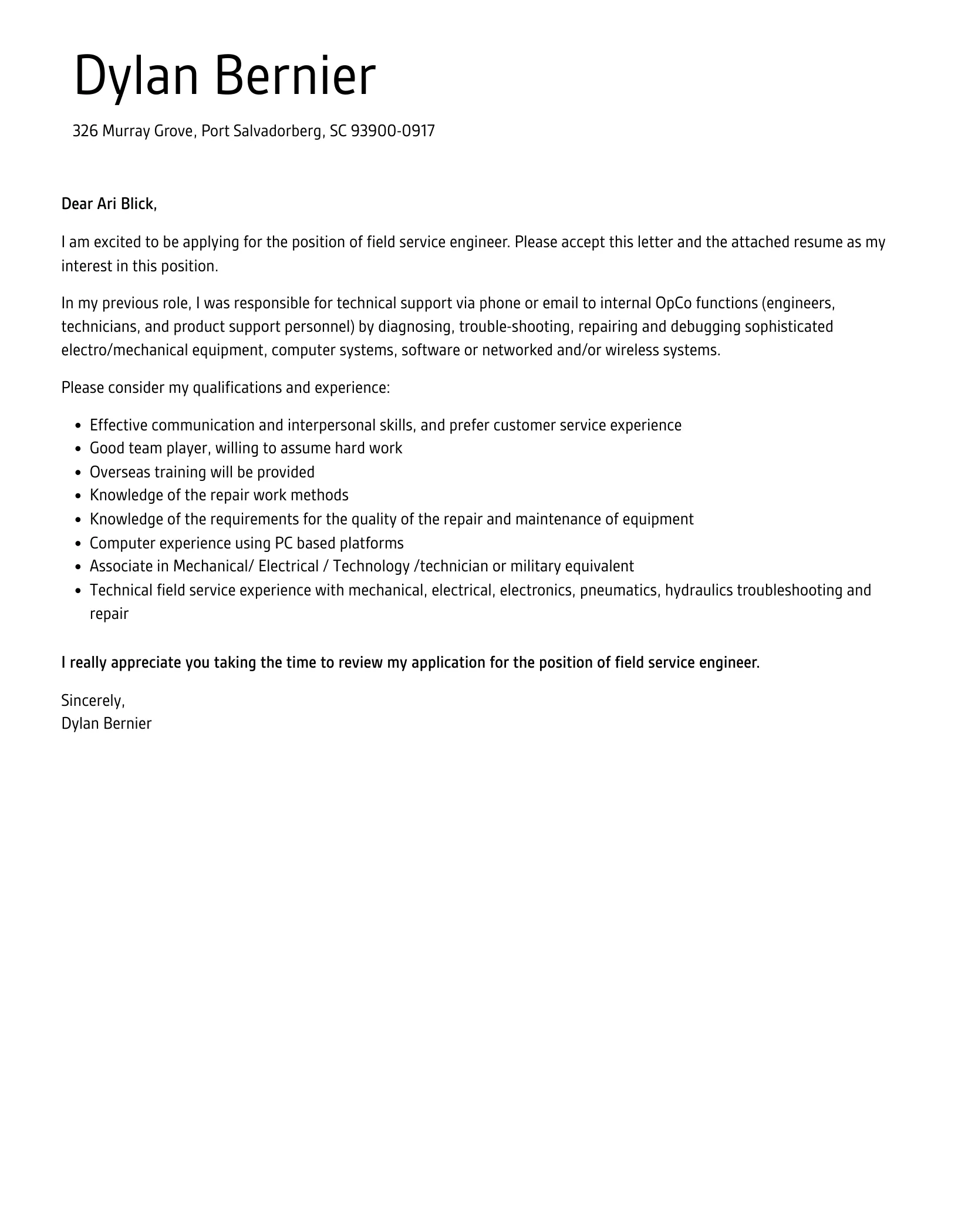
Writing a strong cover letter is a strategic investment in your job search. By following these tips and tricks, you can create a compelling cover letter that showcases your skills, experience, and enthusiasm for the role. Remember to tailor your letter to each job, highlight your achievements with data, and use clear, professional language. Proofread meticulously and seek feedback. A well-crafted cover letter is an invaluable tool for securing interviews and advancing your career as a field service engineer. It sets you apart from other applicants, demonstrating not only your technical skills but also your dedication to the role and your capacity to connect with prospective employers. Invest the time and effort to create a standout cover letter, and watch as it opens doors to new opportunities in your field.
